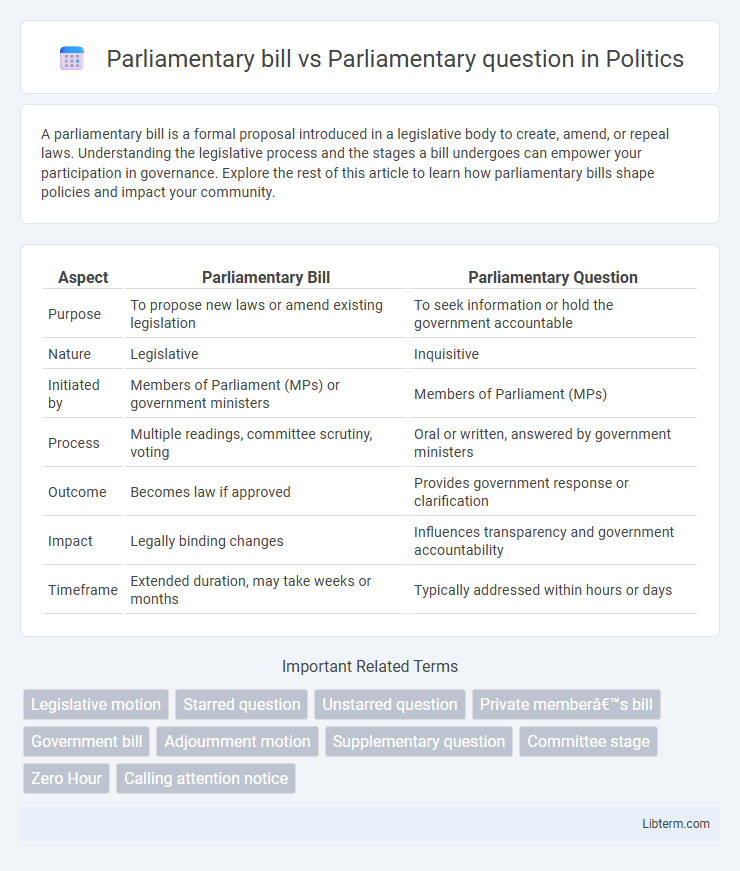A parliamentary bill is a formal proposal introduced in a legislative body to create, amend, or repeal laws. Understanding the legislative process and the stages a bill undergoes can empower your participation in governance. Explore the rest of this article to learn how parliamentary bills shape policies and impact your community.
Table of Comparison
| Aspect | Parliamentary Bill | Parliamentary Question |
|---|---|---|
| Purpose | To propose new laws or amend existing legislation | To seek information or hold the government accountable |
| Nature | Legislative | Inquisitive |
| Initiated by | Members of Parliament (MPs) or government ministers | Members of Parliament (MPs) |
| Process | Multiple readings, committee scrutiny, voting | Oral or written, answered by government ministers |
| Outcome | Becomes law if approved | Provides government response or clarification |
| Impact | Legally binding changes | Influences transparency and government accountability |
| Timeframe | Extended duration, may take weeks or months | Typically addressed within hours or days |
Introduction: Understanding Parliamentary Bill vs Parliamentary Question
A Parliamentary bill is a formal proposal for new legislation or an amendment to existing laws submitted for debate and approval. A Parliamentary question is an official inquiry raised by a member of parliament to seek information or hold the government accountable during sessions. Both tools are essential for legislative scrutiny but serve distinct functions within the parliamentary process.
Definition of a Parliamentary Bill
A Parliamentary Bill is a formal proposal for new legislation or an amendment to existing laws, introduced and debated within a parliamentary body. It undergoes multiple readings and committee evaluations before being approved and enacted as law. Parliamentary Bills differ from Parliamentary Questions, which are inquiries posed by members to hold the government accountable or seek information.
Definition of a Parliamentary Question
A Parliamentary Question is a formal inquiry submitted by a member of the legislature to the government, seeking information or requiring explanations on specific matters of public interest. It serves as a tool for holding the government accountable and ensuring transparency in legislative proceedings. Unlike a Parliamentary Bill, which proposes new laws or amendments, a Parliamentary Question aims solely to obtain detailed responses from government officials.
Key Purposes and Objectives
A parliamentary bill serves as a formal proposal for new legislation or amendments to existing laws, aiming to establish, modify, or repeal statutory regulations. Its key purpose is to create legally binding rules through the legislative process, ensuring governance and public policy implementation. In contrast, a parliamentary question functions as a tool for legislators to seek information, hold the government accountable, and scrutinize administration actions during parliamentary sessions.
Legislative Process: Bills Explained
A parliamentary bill is a formal proposal presented for debate and approval to create or amend laws, representing a crucial step in the legislative process. Parliamentary questions are inquiries posed by members to government ministers aimed at holding the executive accountable and clarifying policy details during legislative sessions. While bills drive the creation of new legislation, parliamentary questions facilitate transparency and oversight within parliamentary proceedings.
Questioning Mechanism: How Questions Work in Parliament
Parliamentary questions serve as a crucial mechanism for holding the government accountable by allowing members to seek information, clarify policies, or raise concerns directly in the legislative chamber. These questions can be oral or written, with oral questions often addressed during designated question periods, enabling real-time responses from ministers. In contrast, parliamentary bills are formal proposals for new laws or amendments introduced, debated, and voted upon but do not function as tools for immediate questioning or information retrieval.
Major Differences Between Bills and Questions
Parliamentary bills are formal proposals for new laws or amendments presented in the legislature, whereas parliamentary questions are inquiries made by members to obtain information or hold the government accountable. Bills undergo multiple readings, debates, and votes before becoming law, while questions are typically addressed through oral or written responses during parliamentary sessions. The primary difference lies in bills' legislative function versus questions' role in oversight and information gathering.
Impact on Governance and Policy
Parliamentary bills drive governance by proposing new laws or amendments that directly shape public policy and regulatory frameworks. Parliamentary questions enhance transparency and accountability by enabling legislators to scrutinize government actions and demand explanations, influencing policy implementation and public trust. Both tools collectively ensure responsive governance, with bills setting legal direction and questions facilitating oversight and informed decision-making.
Case Studies: Examples of Bills and Questions
Parliamentary bills, such as the UK's Finance Act 2023, illustrate legislative proposals undergoing detailed debate and amendments before becoming law, affecting taxation and public finance. Parliamentary questions, exemplified by the 2022 inquiry into climate policy directed to the UK Secretary of State for Environment, serve as tools for holding the government accountable by seeking information or explanations during sessions. Case studies reveal that bills drive structural changes in governance, while questions provide immediate oversight and prompt official responses on current issues.
Conclusion: Importance in Parliamentary Democracy
Parliamentary bills and parliamentary questions play distinct but complementary roles in a parliamentary democracy; bills are essential for creating and amending laws that govern society, while questions hold the government accountable by enabling scrutiny of policies and administration. Effective legislative processes rely on well-crafted bills that reflect public needs and transparent parliamentary questions that ensure government responsiveness. Together, they uphold democratic principles by balancing lawmaking with mechanisms for oversight and transparency.
Parliamentary bill Infographic

 libterm.com
libterm.com